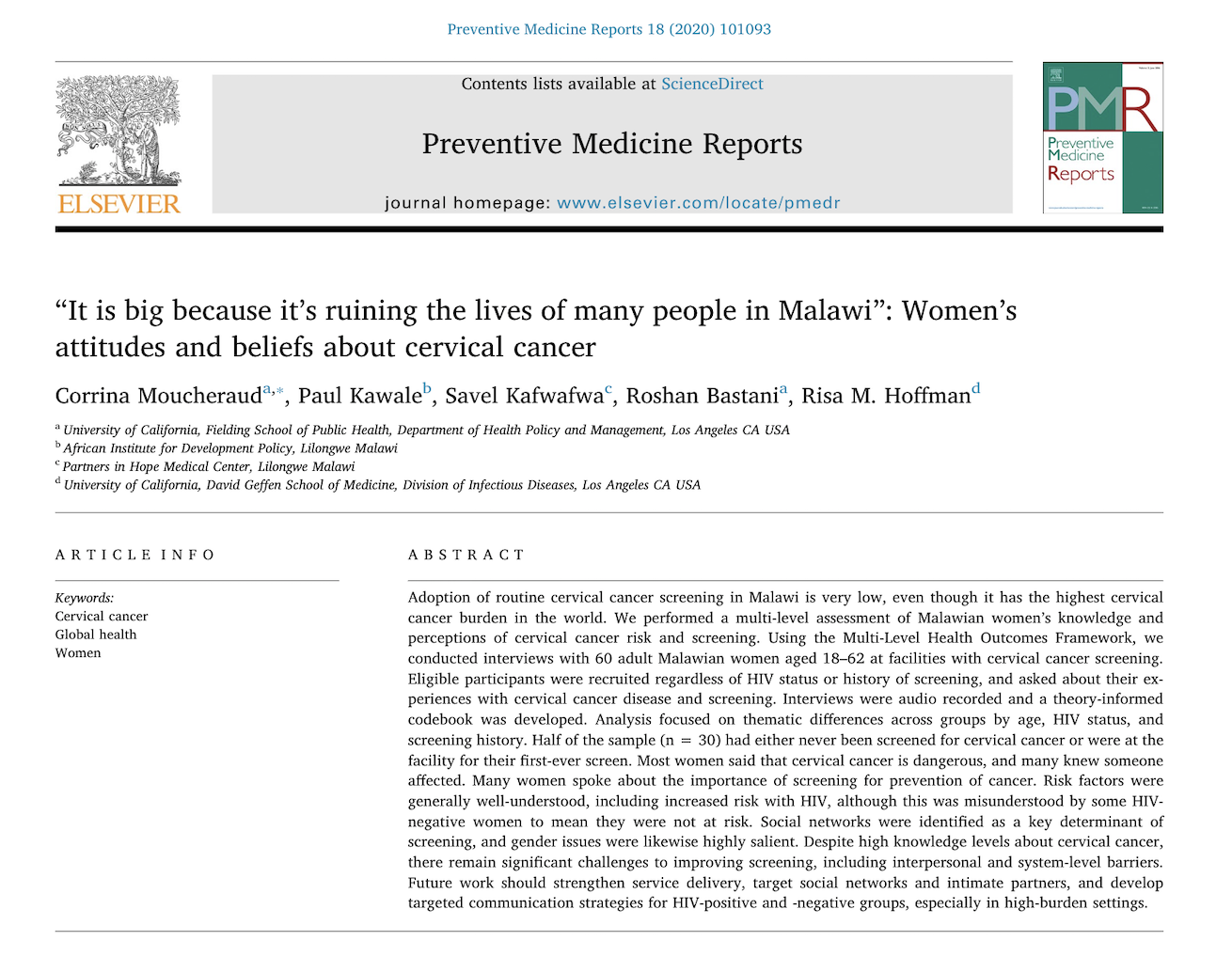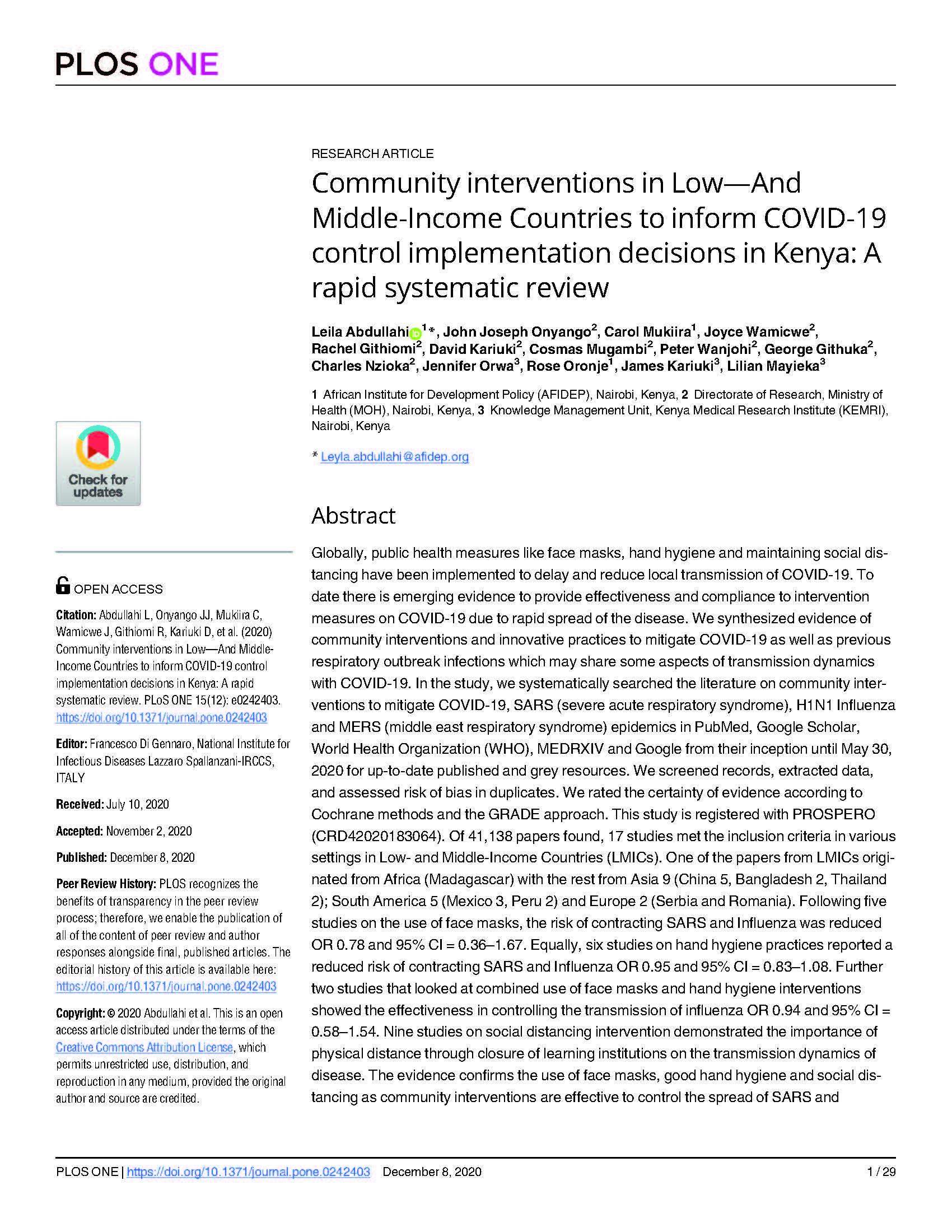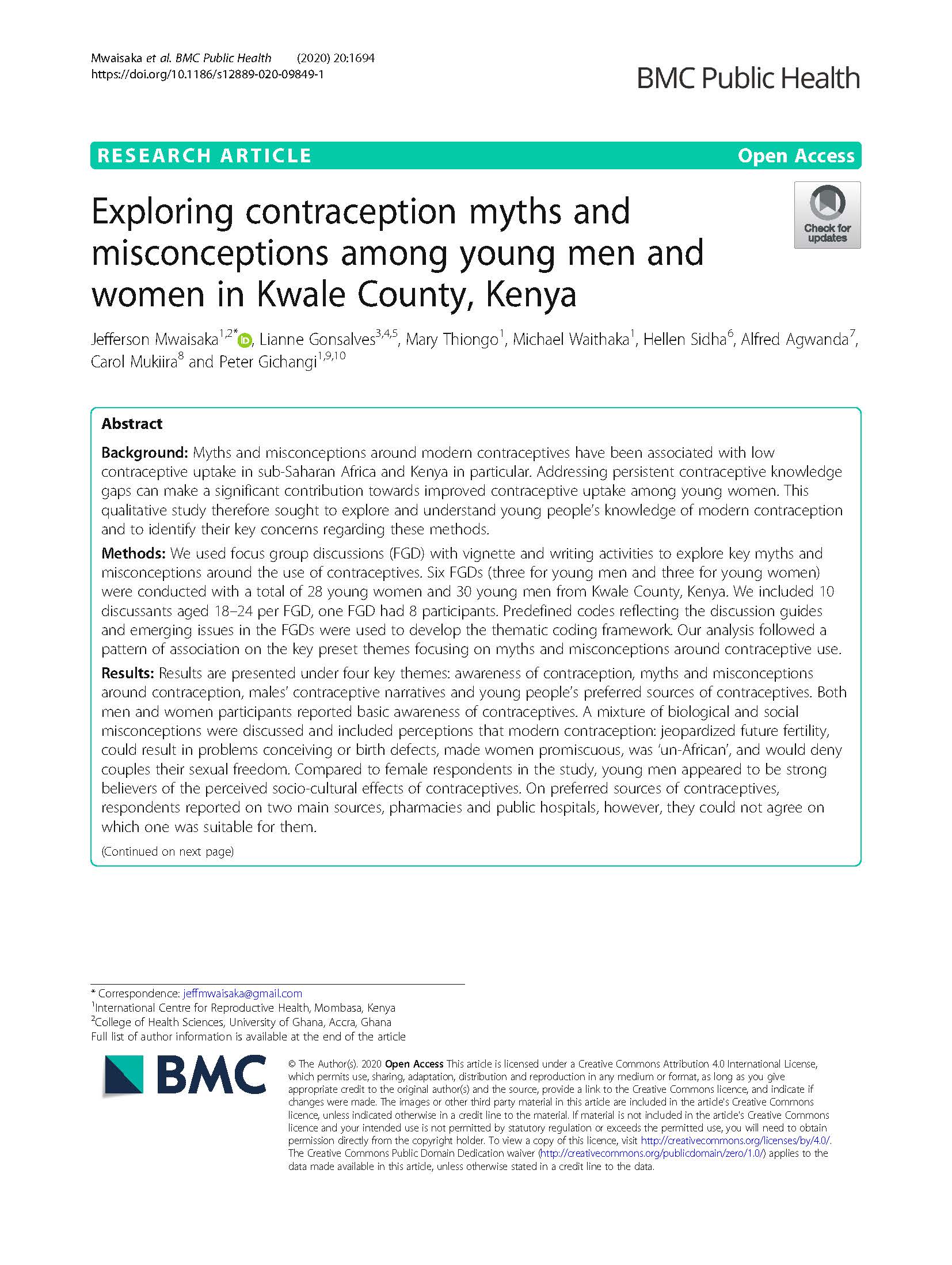Journal Articles

Cervical cancer is a major cause of disease and death in many low-income countries. Prevention strategies have effectively reduced the burden in high-income countries, and this has caused a highly in-equitable global distribution of disease. Adoption of routine cervical cancer screening in Malawi is very low, even though it has the highest cervical cancer burden in the world. We performed a multi-level assessment of Malawian women’s knowledge and perceptions of cervical cancer risk and screening, Malawian women have found low awareness about cervical cancer risk, low perceived susceptibility, and many misconceptions about the role and process of screening. A comprehensive, […]

Nearly fifty million people worldwide are afflicted by sepsis every year, resulting in eleven million deaths annually and sub-Saharan Africa countries are amongst those most heavily affected. This study explores knowledge regarding sepsis among health workers in Lambaréné Gabon; and revealed that there are considerable knowledge gaps regarding sepsis among health workers in Lambaréné, potentially impairing the prompt recognition and management of sepsis. There is a need to establish periodic up- to-date training to improve sepsis knowledge. You can access the full articles here: https://doi.org/10.1016/j.actatropica.2021.105914 Authors: Bayode R Adegbite, Jean Ronald Edoa, Jamie Rylance, Shevin T Jacob, Paul Kawale, Ayola […]

In Africa, HIV positive mothers face many challenges and realities when it comes to breastfeeding. Although recent policies have sought to increase the rates of exclusive breastfeeding (EBF) and continued breastfeeding for HIV exposed infants, few programs have considered the multiple social and cultural barriers to the practice; research conducted qualitative research in Koibatek, a sub-County in Baringo County Kenya; transcribed data was analyzed thematically where evidence revealed that there are multiple facilitators and barriers of optimal breastfeeding that needs a holistic approach to interventions aimed at achieving elimination of mother to child transmission. You can access the full article […]

Health policies inform decisions regarding population health and determine how they will be implemented, covering issues from primary healthcare to health emergencies, Malawi declared a state of national disaster due to the COVID-19 pandemic on 20th March 2020 and registered its first confirmed coronavirus case on the 2 April 2020. The aim of this paper was to document policy decisions made in response to the COVID-19 pandemic from January to August 2020; Malawi used a multi sectoral approach to address health and socioeconomic aspects of the COVID-19 pandemic and findings show there is need to revise the Malawi public health […]

Researchers from the LIGHT (Leaving no-one behind: transforming gendered pathways to health for TB) research programme have contributed to a systematic review in Emerging Infectious Diseases(link is external) looking at pooling samples (sputum) as a potentially efficient approach in testing for tuberculosis (TB) during the COVID-19 pandemic. You can access the full article here: https://wwwnc.cdc.gov/eid/article/27/3/20-4090_article Authors: Luis E. Cuevas, Victor S. Santos, Shirley Verônica Melo Almeida Lima, Konstantina Kontogianni, John S. Bimba, Vibol Iem, Jose Dominguez, Emily Adams, Ana Cubas Atienzar, Thomas Edwards, S. Bertel Squire, Patricia J. Hall, and Jacob Creswell

Exclusive breastfeeding (EBF) for the first 6 months of a child’s life and continued breastfeeding thereafter for up to 2 years, with timely introduction of appropriate complementary feeding at 6 months, is essential for optimal child growth and development. Numerous health, financial, social and economic benefits of EBF have been documented (Victora et al., 2016). Despite the documented benefits of EBF to children and their families, EBF rates remain low in most parts of the world. You can access the full article here: https://www.researchgate.net/publication/349005543_Effectiveness_of_the_baby-friendly_community_initiative_on_exclusive_breastfeeding_in_Kenya Authors: Elizabeth W. Kimani-Murage, Judith Kimiywe, Antonina N. Mutoro, Calistus Wilunda, Frederick Murunga Wekesah, Peter Muriuki, […]

In the past 20 years, the rate of globalization has affected all aspects of society and brought the global village together in search of solutions to complex challenges affecting the health and wellbeing of people, communities, and the planet. In response to these challenges and personal experiences in complex research settings, the authors of this paper initiated a project exploring leadership in ethics, integrity, and research conduct in complex LMIC-UK partnership projects. This paper describes the process of consultations with global researchers from around the world to create an online, open-access toolkit for the global research community; findings show it was […]

Cervical cancer remains a major cause of mortality and morbidity in low- and middle-income countries, despite the availability of effective prevention approaches. Informed by the Consolidated Framework for Implementation Research (CFIR), we conducted interviews with ten experienced “screen and treat” providers in Malawi. Although “screen and treat” is viewed as effective and important, many implementation barriers remain. Our findings suggest that implementation strategies will need to be multi-level, include a diverse set of stakeholders, and explicitly address both screening and treatment. You can access the full article HERE. Authors: Corrina Moucheraud, Paul Kawale , Savel Kafwafwa , Roshan Bastani and […]

Globally, public health measures like face masks, hand hygiene and maintaining social distancing have been implemented to delay and reduce local transmission of COVID-19. To date there is emerging evidence to provide effectiveness and compliance to intervention measures on COVID-19 due to rapid spread of the disease. The study synthesised evidence of community interventions and innovative practices to mitigate COVID-19 as well as previous respiratory outbreak infections which may share some aspects of transmission dynamics with COVID-19.

Myths and misconceptions around modern contraceptives have been associated with low contraceptive uptake in sub-Saharan Africa and Kenya in particular. Addressing persistent contraceptive knowledge gaps can make a significant contribution towards improved contraceptive uptake among young women. This qualitative study therefore sought to explore and understand young people’s knowledge of modern contraception and to identify their key concerns regarding these methods.

In sub‐Saharan Africa (SSA), rapid urbanisation coupled with the high prevalence of infant and young child (IYC) undernutrition in low‐income settings means that interventions to support IYC nutrition are a priority. Little is known about how urbanisation influences IYC feeding (IYCF) practices, and evidence‐based interventions to improve IYC health/nutrition in the urban poor are lacking. Therefore, this research aimed to (a) systematically review evidence on interventions for improving the nutritional status of IYC aged 6–23 months living in urban poor areas (PROSPERO CRD42018091265) and (b) engage stakeholders to identify the highest ranking evidence gaps for improving IYCF programmes/policies.

Having access to convenient and quality healthcare at all times is not only a human right but also a goal that many countries strive to achieve for their population. However, access to healthcare might face blocks in the presence of financial exclusions. Saudi Arabia has, over the years, continued to pursue policy and system reforms to enhance its population’s access to financial inclusion, as well as proper health coverage to improve health outcomes. This study seeks to estimate the effects of financial inclusion on the financial hardships in accessing healthcare in Saudi Arabia.

